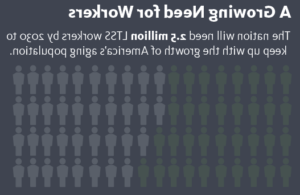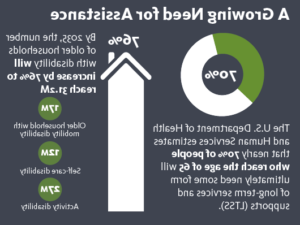About the Program
The Aging Services Leadership degree is for those interested in becoming an administrative leader serving aging populations to enhance their quality of life and overall wellness. This program will provide a foundational understanding of the wellspan and healthspan, physiological, and social aspects of aging, coupled with the skills required to implement patient-center care, including understanding the rising needs of our aging population, planning and preparation for the coming demographic shifts, long term care/gerontology business acumen, and the role society plays in the aging process.
Through the Aging Services Leadership online program you will gain hands-on experiences in the aging services sector through immersive classroom experiences, expert course content, and your personalized Senior Experience – all of which will prepare you to be an advocate for improving the quality of life and aging experience of our rapidly growing population of older adults.
Within the Aging Services Leadership Pathway there are multiple program options to meet your needs. All are ONLINE programs.
MSU Denver tackles critical shortage of elder-care workers
Coloradans are getting older, but caregivers are in short supply. A new program in aging services will help to replenish jobs lost during the pandemic. Read The Full Article

“Everyone has a right to a peaceful last season of their lives,” said Amy Dore, professor in MSU Denver’s Department of Health Professions. “When you have (an aging population combined with a staffing exodus), who’s left to care for folks? That’s what we’re hoping to answer.”
Career Opportunities
Upon completion of MSU Denver’s fully online Aging Services Leadership Degree you will have the knowledge and skills necessary for an administrative or leadership role in long term care administration, nursing home administration, or other aging services leadership roles in the following health care fields:
- Long Term Care/Nursing Home Services
- Hospice and Palliative Care
- Home Care
- Community Health and Advocacy
- Hospital Systems
- Information Technology Systems
Career Outlook
The Colorado chapter of LeadingAge provides some key data relevant to the growing need for assistance and the importance of Aging Services Leadership itself.

The population of adults age 65 and older will increase from 47.8 million in 2015 to 88 million in 2050.

The US will need 2.5 million LTSS workers by 2030 to keep up with the growth of America’s aging population.

The U.S. Department of Health and Human Services estimated that nearly 70% of people who reach the age of 65 will ultimately need some form of long-term services and supports (LTSS).
Through 2026, the projected growth of jobs in healthcare settings is at 18%. But, the demand for home health and personal care aides will far outpace the sector’s growth, with an increase of 41% to more than 4 million jobs.
Meet with an Advisor!

If you are interested in Aging Services Leadership but have more questions, please contact us!
You can set up an advising appointment with Dr. Amy Dore by emailing her at [email protected].
You can also request an advising appointment on our Academic Advising Webpage.
Aging Services Management Major, B.S.
The Aging Services Management Major requires the following courses and electives. In addition to the courses listed below, courses might require prerequisites. Please work with your academic advisor to create a personalized course plan.
Summary of Major Requirements
Required Core Courses: 45 Credits
Required Ancillary Courses: 6 credits
Required Elective Courses: 12 Credits
Senior Experience: 3 credits
Total for Major : 66 credits
Major Course Information
- AGE 1010 – Aging Services Leadership: Introduction to Aging and Long-Term Care Service Credits: 3
- AGE 2020 – Ageism and Ableism in Society Credits: 3
- AGE 3030 – Aging Services: Current Topics, Trends, and Future Considerations Credits: 3
- AGE 3800 – Long-Term Care: Managing Across the Continuum Credits: 3
- COMM 3220 – Communication and the Elderly Credits: 3
- HCM 2500 – Health Care Management Foundations, Professionalism, and Applications Credits: 3
- HCM 3150 – Health Care Organization and Management Credits: 3
- HCM 3700 – Health Disparities in the U.S. Credits: 3
- ITP 3111 – Aging Warriors: Understanding the Health Issues of Aging Men Credits: 3
- ITP 3200 – Ethics in Health Care Credits: 3
- PUB 2000 – Community Health Worker Fundamentals Credits: 3
- PUB 4000 – Health Policy – Practice and Development Credits: 3
- SOC 1040 – Introduction to Social Gerontology Credits: 3
- SOC 3040 – Sociology of Aging Credits: 3
- PSY 2270 – Death, Dying, and Grieving Credits: 3 OR SOC 3100 – Death and Dying Credits: 3
All students must complete the following courses. These courses can also count towards the General Studies Requirements.
- SOC 1010 – People, Power, and Progress Credits: 3
- PSY 1001 – Introductory Psychology Credits: 3
A minimum of 6 credit hours must be upper division.
- HCM 3030 – Health Care Jurisprudence Credits: 3
- HCM 3100 – Entrepreneurship in Health Credits: 1
- HCM 3200 – Managing Quality in Health Care Credits: 2
- HCM 3400 – Human Resources Management in Health Care Credits: 3
- HCM 3500 – Health Care Research Methods Credits: 3
- HCM 3550 – Leadership in Health Care Credits: 1
- HCM 3600 – Health Information Systems Credits: 3
- HCM 3750 – Professional Practice Management Credits: 1
- HCM 4030 – Financial Management in Health Care Credits: 3
- HCM 4040 – Health Care Economics Credits: 3
- HCM 4300 – Strategic Management in Health Care Credits: 3
- ITP 1700 – Medical Terminology Credits: 3
- ITP 2800 – Health, Society, and the Environment Credits: 3
- ITP 2950 – Wellness Coaching I Credits: 3
- ITP 3000 – Men’s Health Credits: 3
- ITP 3100 – Health Education and Counseling Credits: 3
- ITP 3700 – Physiology of Aging Credits: 3
- ITP 3800 – Stress and Sleep: Impact on Health and Disease Credits: 3
- ITP 3850 – Lifestyle Medicine Credits: 3
- ITP 4100 – Women’s Holistic Health Credits: 3
- ITP 4400 – Wellness Coaching II Credits: 3
- ITP 4700 – Community Health Education and Lifestyle Medicine Credits: 3
- ITP 4800 – Lifestyle Medicine Across Gender and Lifespan Credits: 3
- ITP 4950 – Community Coaching for Health Credits: 3
- HCPS 4000 – Health Care Operations Credits: 3
- HCPS 4010 – Evidence Based Health Care Delivery Credits: 3
- PUB 1000 – Principles of Public Health Credits: 3
- PUB 3000 – Health Behavior Theory and Practice Credits: 3
- PUB 3010 – Community Health Survey, Assessment and Health Improvement Planning Credits: 3
- PUB 3020 – Introduction to Epidemiology in Public Health Credits: 3
- PUB 3030 – Essentials of Environmental Health in Public Health Practices Credits: 3
- PUB 4010 – Health Program Planning, Implementation, and Evaluation Credits: 3
- PUB 4030 – Advanced Community Health Worker Credits: 3
- HCM 4610 – Health Professions Internship Credits: 3
OR
- ITP 4999 – Applied Learning with Lifestyle Medicine Credits: 3
Aging Services Management Minor
The Aging Services Management Minor requires the following courses and electives. In addition to the courses listed below, courses might require prerequisites. Please work with your academic advisor to create a personalized course plan.
Summary of Minor Requirements
Required Core Courses: 12 Credits
Required Elective Courses: 6 Credits
Total for Minor: 18 Credits
Minor Course Information
- AGE 1010 – Aging Services Leadership: Introduction to Aging and Long-Term Care Service Credits: 3*
- AGE 2020 – Ageism and Ableism in Society Credits: 3 *
- AGE 3030 – Aging Services: Current Topics, Trends, and Future Considerations Credits: 3
- AGE 3800 – Long-Term Care: Managing Across the Continuum Credits: 3
*Completion of AGE 1010 & AGE 2020 qualifies student for the Aging Services Digital Badge.
Choose at least 6 credits from the following (at least 3 hours must be upper division):
- ANT 3480 – Cultural Diversity in Health and Illness Credits: 3
- COMM 3220 – Communication and the Elderly Credits: 3
- FIN 3450 – Retirement Planning and Employee Benefits Credits: 3
- HCM 2010 – Global Health Systems Credits: 3
- HCM 3030 – Health Care Jurisprudence Credits: 3
- HCM 3100 – Entrepreneurship in Health Credits: 1
- HCM 3150 – Health Care Organization and Management Credits: 3
- HCM 3200 – Managing Quality in Health Care Credits: 2
- HCM 3400 – Human Resources Management in Health Care Credits: 3
- HCM 3550 – Leadership in Health Care Credits: 1
- HCM 3600 – Health Information Systems Credits: 3
- HCM 3700 – Health Disparities in the U.S. Credits: 3
- HCM 3750 – Professional Practice Management Credits: 1
- HCM 4030 – Financial Management in Health Care Credits: 3
- HCM 4300 – Strategic Management in Health Care Credits: 3
- HCPS 4000 – Health Care Operations Credits: 3
- HCPS 4010 – Evidence Based Health Care Delivery Credits: 3
- HLDR 3800 – Servant Leadership in Hospitality Credits: 3
- HSP 4520 – Grief Counseling Credits: 3
- ITP 1700 – Medical Terminology Credits: 3
- ITP 2820 – Anger In Men: A Whole Approach Credits: 3
- ITP 2950 – Wellness Coaching I Credits: 3 ** OR
- ESS 2700 – Wellness Coaching I Credits: 3 **
- ITP 3000 – Men’s Health Credits: 3
- ITP 3100 – Health Education and Counseling Credits: 3
- ITP 3111 – Aging Warriors: Understanding the Health Issues of Aging Men Credits: 3
- ITP 3200 – Ethics in Health Care Credits: 3
- ITP 3700 – Physiology of Aging Credits: 3
- ITP 3810 – Men Across Cultures Credits: 3
- ITP 3850 – Lifestyle Medicine Credits: 3
- ITP 4100 – Women’s Holistic Health Credits: 3
- ITP 4400 – Wellness Coaching II Credits: 3 ** OR
- ESS 4700 – Wellness Coaching II Credits: 3 **
- ITP 4800 – Lifestyle Medicine Across Gender and Lifespan Credits: 3
- ITP 4950 – Community Coaching for Health Credits: 3
- NUT 3050 – Concepts of Lifecycle Nutrition Credits: 3
- PSY 1001 – Introductory Psychology Credits: 3
- PSY 2270 – Death, Dying, and Grieving Credits: 3
- PSY 3270 – Adulthood and Aging Credits: 3
- PUB 1000 – Principles of Public Health Credits: 3
- PUB 2000 – Community Health Worker Fundamentals Credits: 3
- PUB 3000 – Health Behavior Theory and Practice Credits: 3
- PUB 3010 – Community Health Survey, Assessment and Health Improvement Planning Credits: 3
- PUB 3020 – Introduction to Epidemiology in Public Health Credits: 3
- PUB 3030 – Essentials of Environmental Health in Public Health Practices Credits: 3
- PUB 4000 – Health Policy – Practice and Development Credits: 3
- PUB 4010 – Health Program Planning, Implementation, and Evaluation Credits: 3
- PUB 4030 – Advanced Community Health Worker Credits: 3
- SOC 1010 – People, Power, and Progress Credits: 3
- SOC 1040 – Introduction to Social Gerontology Credits: 3
- SOC 3040 – Sociology of Aging Credits: 3
- SOC 3100 – Death and Dying Credits: 3
- SOC 3810 – Population Issues: Life, Death and Migration Credits: 3
- SWK 3030 – Social Work with Older People Credits: 3
Aging Services Management Certificate
The Aging Services Leadership certificate assists individuals interested in gaining knowledge pertaining to aging, eldercare, and gerontology. The certificate will prepare individuals to understand the cultural, physical, and social aspects of aging along with the aspects of how aging affect populations. The certificate will prepare individuals to apply administrative principles required in the management of aging services such as nursing home, long term care settings, and home health services. The certificate includes required pre-requisite and core courses along with elective courses in which students can tailor the certificate to meet specifications of their career goals.
The Aging Services Leadership Certificate program is eligible for financial aid. The certificate is 32 weeks long at full-time enrollment which is 12 or more credit hours per semester.
Certificate Course Information
- AGE 1010 – Aging Services Leadership: Introduction to Aging and Long-Term Care Service Credits: 3*
- AGE 2020 – Ageism and Ableism in Society Credits: 3 *
- AGE 3030 – Aging Services: Current Topics, Trends, and Future Considerations Credits: 3
- AGE 3800 – Long-Term Care: Managing Across the Continuum Credits: 3
*Completion of AGE 1010 & AGE 2020 qualifies student for the Aging Services Digital Badge.
12 Credit Hours Required (3 Credit Hours Must Be Upper Division)
- ANT 3480 – Cultural Diversity in Health and Illness Credits: 3
- COMM 3220 – Communication and the Elderly Credits: 3
- FIN 3450 – Retirement Planning and Employee Benefits Credits: 3
- HCM 2010 – Global Health Systems Credits: 3
- HCM 3030 – Health Care Jurisprudence Credits: 3
- HCM 3100 – Entrepreneurship in Health Credits: 1
- HCM 3150 – Health Care Organization and Management Credits: 3
- HCM 3200 – Managing Quality in Health Care Credits: 2
- HCM 3400 – Human Resources Management in Health Care Credits: 3
- HCM 3550 – Leadership in Health Care Credits: 1
- HCM 3600 – Health Information Systems Credits: 3
- HCM 3700 – Health Disparities in the U.S. Credits: 3
- HCM 3750 – Professional Practice Management Credits: 1
- HCM 4030 – Financial Management in Health Care Credits: 3
- HCM 4300 – Strategic Management in Health Care Credits: 3
- HCPS 4000 – Health Care Operations Credits: 3
- HCPS 4010 – Evidence Based Health Care Delivery Credits: 3
- HLDR 3800 – Servant Leadership in Hospitality Credits: 3
- HSP 4520 – Grief Counseling Credits: 3
- ITP 1700 – Medical Terminology Credits: 3
- ITP 2820 – Anger In Men: A Whole Approach Credits: 3
- ITP 2950 – Wellness Coaching I Credits: 3 ** OR
- ESS 2700 – Wellness Coaching I Credits: 3 **
- ITP 3000 – Men’s Health Credits: 3
- ITP 3100 – Health Education and Counseling Credits: 3
- ITP 3111 – Aging Warriors: Understanding the Health Issues of Aging Men Credits: 3
- ITP 3200 – Ethics in Health Care Credits: 3
- ITP 3700 – Physiology of Aging Credits: 3
- ITP 3810 – Men Across Cultures Credits: 3
- ITP 3850 – Lifestyle Medicine Credits: 3
- ITP 4100 – Women’s Holistic Health Credits: 3
- ITP 4400 – Wellness Coaching II Credits: 3 ** OR
- ESS 4700 – Wellness Coaching II Credits: 3 **
- ITP 4800 – Lifestyle Medicine Across Gender and Lifespan Credits: 3
- ITP 4950 – Community Coaching for Health Credits: 3
- NUT 3050 – Concepts of Lifecycle Nutrition Credits: 3
- PSY 1001 – Introductory Psychology Credits: 3
- PSY 2270 – Death, Dying, and Grieving Credits: 3
- PSY 3270 – Adulthood and Aging Credits: 3
- PUB 1000 – Principles of Public Health Credits: 3
- PUB 2000 – Community Health Worker Fundamentals Credits: 3
- PUB 3000 – Health Behavior Theory and Practice Credits: 3
- PUB 3010 – Community Health Survey, Assessment and Health Improvement Planning Credits: 3
- PUB 3020 – Introduction to Epidemiology in Public Health Credits: 3
- PUB 3030 – Essentials of Environmental Health in Public Health Practices Credits: 3
- PUB 4000 – Health Policy – Practice and Development Credits: 3
- PUB 4010 – Health Program Planning, Implementation, and Evaluation Credits: 3
- PUB 4030 – Advanced Community Health Worker Credits: 3
- SOC 1010 – People, Power, and Progress Credits: 3
- SOC 1040 – Introduction to Social Gerontology Credits: 3
- SOC 3040 – Sociology of Aging Credits: 3
- SOC 3100 – Death and Dying Credits: 3
- SOC 3810 – Population Issues: Life, Death and Migration Credits: 3
- SWK 3030 – Social Work with Older People Credits: 3
Aging Services Management Digital Badge
Students must complete 6 credit hours (courses listed below) and 1 immersive experience (webinar, interview, volunteering). The Aging Services Digital Badge can be a stand-alone achievement, add on, or it can be utilized as a feeder into a certificate or bachelor’s degree program. Students in any major whether undergraduate or graduate, can complete the Digital badge.
The Aging Services Management Digital Badge requires the following courses.
Required Courses:
- AGE 1010 – Aging Services Leadership: Introduction to Aging and Long-Term Care Service Credits: 3
- AGE 2020 – Ageism and Ableism in Society Credits: 3
Aging Services Career Launchpad
Become an advocate for the aging
This introductory course serves as starting point for those eager to pursue careers caregiving for – or working with — aging populations, whether you’re a healthcare professional, a family member, or someone interested in working in the field.
The course explores support systems, services, and policy considerations designed to meet the needs of older adults and includes topics such as the physical and mental changes associated with aging, common health issues affecting seniors and the older population, and effective communication strategies for senior engagement and inclusion.
This introductory online course serves as an ideal starting point for those eager to pursue careers caregiving for our aging population and can stack into a MSU Denver credential or degree.
Accreditation
Academic Accreditation is an assurance of the quality of an academic program. The Higher Learning Commission (HLC) is an independent corporation that was founded in 1895 as one of six regional institutional accreditors in the United States. HLC accredits degree-granting post-secondary educational institutions in the North Central region, including Colorado and 18 other states. The mission of the HLC is to serve the common good by assuring and advancing the quality of higher learning. For more information, please visit the Higher Learning Commission.
Call or Email Us
303-615-1200
[email protected]
Visit Us
Central Classroom Building 220
1055 10th Street, Ste. 220, Denver, CO 80204
To get assistance, please visit our Department Support Portal.
Mailing Address
Department of Health Professions
Metropolitan State University of Denver
Campus Box 33, PO Box 173362
Denver, CO 80217-3362


